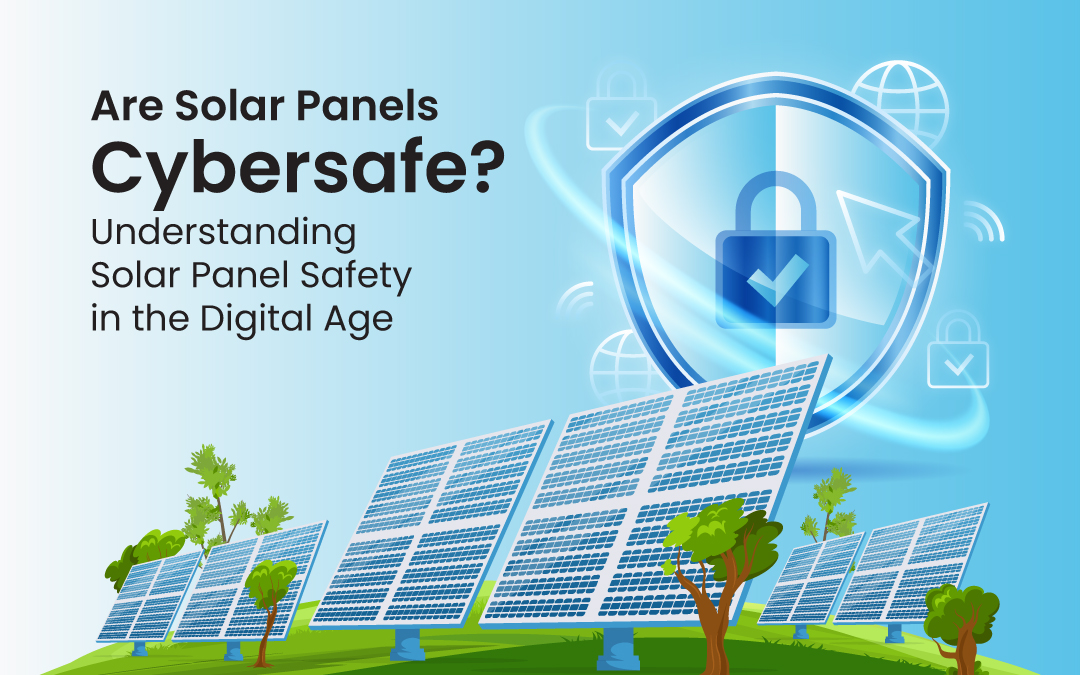
In recent years, more people than ever are making the switch to renewable energy, with solar panels being a popular choice for homeowners and businesses alike. Solar panels offer an eco-friendly solution to rising energy costs and environmental concerns, harnessing the sun’s power to generate electricity. As we continue to embrace this green technology, it’s essential to understand that, like all connected devices, solar panels come with their own set of cybersecurity risks.
Why Are Solar Panels So Popular?
Solar panels have become synonymous with sustainable living. As the cost of solar technology has decreased and efficiency has increased, solar panels are now more accessible to a broader range of consumers. They provide a way to reduce electricity bills, decrease reliance on fossil fuels, and contribute to a cleaner environment. Moreover, with the advent of smart home technology, solar panel systems can now be integrated into a comprehensive energy management strategy, allowing users to monitor and control energy usage from anywhere in the world.
However, as with any internet-connected technology, this convenience comes with certain risks.
The Hidden Cybersecurity Risks of Solar Panels
When most people think about solar panels, cybersecurity isn’t the first thing that comes to mind. However, as ExpressVPN reports, these systems become more sophisticated and interconnected, they also become more vulnerable to cyberattacks. Here’s why:
1. Smart Solar Systems and Internet Connectivity
Modern solar panel systems often come equipped with smart inverters and monitoring software that connect to the internet. These components allow users to track their energy production and consumption in real-time, and some systems even enable remote management of energy flows. While this connectivity brings convenience, it also opens up a potential gateway for hackers.
Once connected to your home network, a compromised solar panel system could be exploited to gain access to other devices within the network. This could include anything from smart thermostats to home security systems, creating a ripple effect of vulnerabilities that can compromise the security of your entire home.
2. Exposure of Your IP Location and Personal Data
Every device connected to the internet has an IP address—a unique identifier that reveals your approximate geographic location. If your solar panel system is hacked, this information could be used to pinpoint your home’s location or gather other sensitive information. Cybercriminals could potentially use this data to monitor when you're home or away, increasing the risk of physical break-ins.
Moreover, some solar panel monitoring systems require users to enter personal information such as names, addresses, and even billing details. If a hacker gains access to this data, it could lead to identity theft or financial fraud.
3. Potential for Larger Scale Attacks
On a larger scale, if a vulnerability is found in a popular brand of solar panel inverters or monitoring software, it could be exploited across thousands of homes and businesses globally, both small and large. This could lead to widespread power disruptions or even act as a vector for a more extensive cyber attack on national grid systems, posing a significant risk to energy security.
How to Protect Your Solar Panels from Cyber Attacks
While the idea of your solar panels being hacked might sound like something out of a sci-fi movie, it’s a real threat in today’s digital landscape. Here are some steps you can take to safeguard your solar panel system:
- Choose a Reputable Manufacturer: When selecting a solar panel system, research the manufacturer’s commitment to cybersecurity. Look for systems that use encryption and secure communication protocols.
- Regularly Update Firmware: Just like any other software, the firmware in your solar panel system can have vulnerabilities. Make sure to regularly update the firmware to protect against known security threats.
- Secure Your Network: Ensure your home Wi-Fi network is secure by using strong, unique passwords and enabling network encryption. Consider setting up a separate network for your solar panel system to isolate it from other devices.
- Monitor for Unusual Activity: Keep an eye on your system’s performance and watch for any signs of unusual activity that could indicate a security breach.
The Pros and Cons of Solar Panels: A Quick Overview
As we’ve discussed, while solar panels offer significant benefits, they are not without their risks. Here’s a quick rundown of the pros and cons:
Pros:
- Cost Savings: Solar panels can significantly reduce electricity bills and offer a return on investment over time.
- Environmental Impact: Solar energy is a clean, renewable source of power that reduces reliance on fossil fuels.
- Energy Independence: Solar panels provide a level of energy independence, especially when paired with battery storage.
Cons:
- Upfront Costs: The initial investment for solar panels can be high, though various incentives and financing options are available.
- Weather Dependent: Solar energy production is dependent on sunlight, which can be less reliable in certain climates or during certain times of the year.
- Cybersecurity Risks: As discussed, solar panels connected to the internet can be vulnerable to hacking and cyberattacks.
Conclusion: Balancing Benefits and Risks
As with any technology, the key to safely enjoying the benefits of solar panels lies in understanding and managing the associated risks. By staying informed about potential cybersecurity threats and taking proactive steps to protect your solar panel system, you can enjoy the advantages of renewable energy without compromising your home’s security.
Solar panels represent a significant step towards a more sustainable future. However, as we continue to integrate them into our smart homes and businesses, it’s crucial to prioritize their security to ensure they remain a safe and reliable source of energy.
Stay safe, stay green, and stay informed!
Share this post
Leave a comment
All comments are moderated. Spammy and bot submitted comments are deleted. Please submit the comments that are helpful to others, and we'll approve your comments. A comment that includes outbound link will only be approved if the content is relevant to the topic, and has some value to our readers.

Comments (0)
No comment